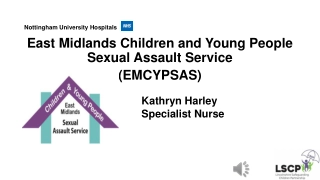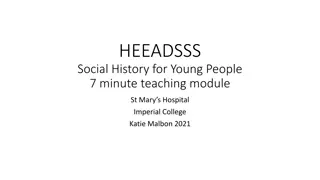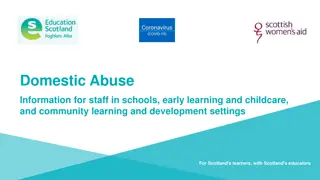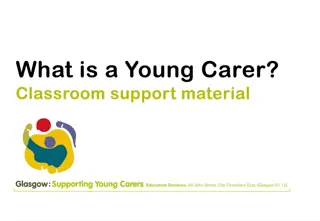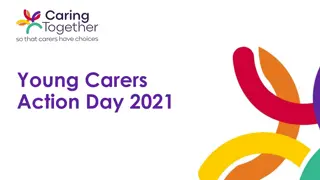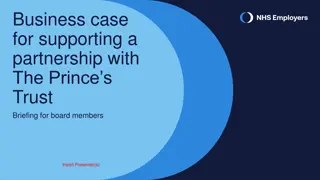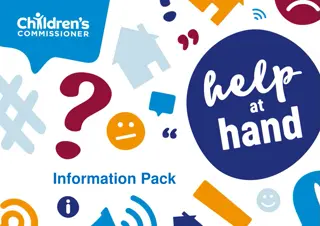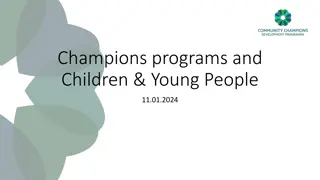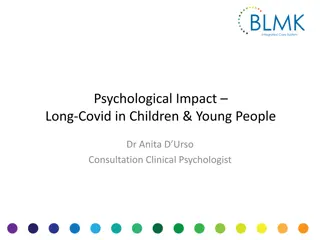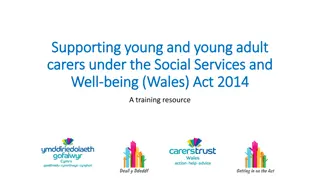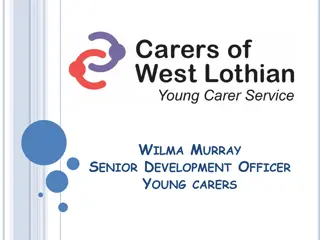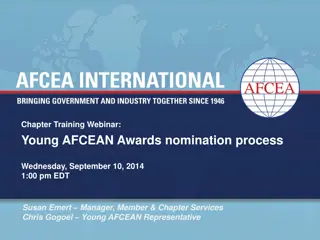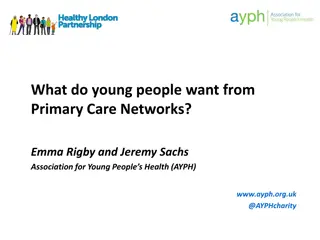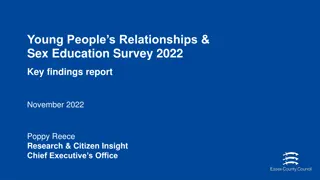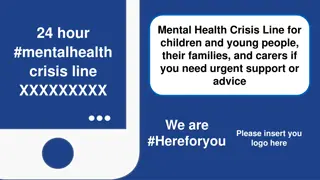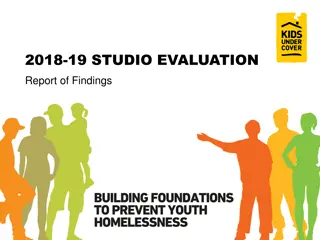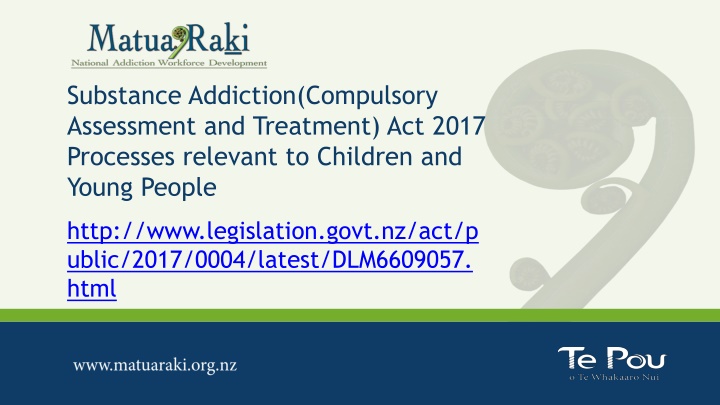
Compulsory Assessment and Treatment for Substance Addiction in Children and Young People
Explore the Substance Addiction (Compulsory Assessment and Treatment) Act of 2017, focusing on processes concerning children and young individuals. Learn about the criteria, application procedures, and the importance of considering the welfare and wishes of minors in compulsory treatment decisions.
Uploaded on | 0 Views
Download Presentation

Please find below an Image/Link to download the presentation.
The content on the website is provided AS IS for your information and personal use only. It may not be sold, licensed, or shared on other websites without obtaining consent from the author. If you encounter any issues during the download, it is possible that the publisher has removed the file from their server.
You are allowed to download the files provided on this website for personal or commercial use, subject to the condition that they are used lawfully. All files are the property of their respective owners.
The content on the website is provided AS IS for your information and personal use only. It may not be sold, licensed, or shared on other websites without obtaining consent from the author.
E N D
Presentation Transcript
Substance Addiction(Compulsory Assessment and Treatment) Act 2017 Processes relevant to Children and Young People http://www.legislation.govt.nz/act/p ublic/2017/0004/latest/DLM6609057. html
Section 3 The purpose of this Act is to enable persons to receive compulsory treatment if they have a severe substance addiction and their capacity to make decisions about treatment for that addiction is severely impaired, so that the compulsory treatment may (a) protect them from harm Section 8 (1) (b) a serious danger to the health or safety of the person and seriously diminishes the person s ability to care for himself or herself.
Criteria for compulsory treatment Section 7 A person may be subject to compulsory treatment under this Act only if (a) the person has a severe substance addiction; and (b) the person s capacity to make informed decisions about treatment for that addiction is severely impaired; and (c) compulsory treatment of the person is necessary; and (d) appropriate treatment for the person is available
Section 10 Compulsory treatment to be option of last resort For the purposes of section 7(c), compulsory treatment is necessary only if voluntary treatment is unlikely to be effective in addressing the severe substance addiction.
Application Section 14 1. An applicant who believes that a person has a severe substance addiction may apply to the Area Director to have the person assessed under this subpart 2. The applicant must be at least 18 years of age.
Section 13 Every person and every court that exercises, or proposes to exercise, a power conferred by or under this Act in respect of a patient who is a child or young person must be guided by : (c) a decision affecting the child or young person may be taken only after consideration of the likely impact of the decision (i) on the welfare of the child or young person; and (ii) on the stability of the family, wh nau, and family group of the child or young person: (d) consideration should be given to the wishes of the child or young person, to the extent that those wishes can reasonably be ascertained, and those wishes should be given the weight that is appropriate in the circumstances, having regard to the age, maturity, and culture of the child or young person
Section 20 Certain approved specialists to undertake assessment of child or young person, if practicable Wherever practicable, a specialist assessment of a child or young person must be conducted by an approved specialist who practises in the field of child or adolescent psychiatry or child or adolescent psychology.
Section 24 Restriction on signing compulsory treatment certificate for child or young person An approved specialist may sign a compulsory treatment certificate in respect of a child or young person (a) only after the specialist has confirmed, with the department responsible for the administration of the Oranga Tamariki Act 1989, whether that department has any involvement with the child or young person (and the extent of any involvement); and (b) only if satisfied that appropriate treatment for the severe substance addiction of the child or young person cannot be given in accordance with an order or other determination under the Oranga Tamariki Act 1989.
Section 33 Restriction on making compulsory treatment order in respect of child or young person The court may make a compulsory treatment order for a child or young person only if satisfied that appropriate treatment for the severe substance addiction of the child or young person cannot be given pursuant to an order or other determination under the Oranga Tamariki Act 1989.
Section 65 Child or young person entitled to have adult present Every child or young person who is examined by a medical practitioner under section 17, or is assessed by an approved specialist under section 20, or is interviewed by a Judge under section 75, is entitled to have present during that examination or interview 1 adult who consents to be present and who is nominated for that purpose by (a) that child or young person; or (b) if it is impracticable for the child or young person to make such a nomination, the Area Director or an authorised officer.
Section 66 Parents and others to be informed of decisions Section 78 Court may call for report on patient (3) Without limiting the generality of subsection (1), in the case of a child or young person, the court may direct the chief executive to locate the information, if any, that the department responsible for the administration of the Oranga Tamariki Act 1989 holds about the background, circumstances, and needs of the child or young person and to provide that information to the court.
Section 81 Appointment of lawyer to represent child or young person If an application to which this subpart applies relates to a child or young person who is not represented by a lawyer, the court or the Registrar of the court must, as soon as practicable after the application has been filed, appoint a lawyer to represent the child or young person.

